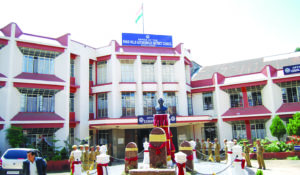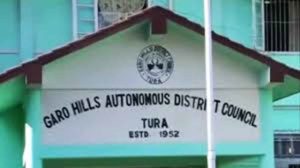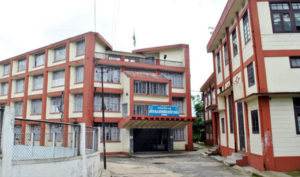
SHILLONG, April 23: The three autonomous district councils (ADCs) of the state will have a joint meeting on Monday to discuss the proposed amendment to the Sixth Schedule of the Constitution which seeks, among others, barring village headmen from joining active politics. Besides, the move is to deny ST certificate to those opting for using paternal family name in lieu of time tested tradition of using mother’s surname.
KHADC’s chief executive member, Titosstarwell Chyne said the joint meeting to be held in the KHADC conference room will be attended by his JHADC and GHADC counterparts, Executive Members (EMs), and senior officials of the Council.
The other issues to be discussed in the meeting include the Uniform Civil Code, greater financial powers for the councils, he said.
The KHADC, it may be recalled, has decided to oppose any increase in the number of seats in the ADCs to 40 as is being proposed in the Constitution (One Hundred and Twenty-fifth Amendment) Bill, 2019 that seeks to amend provisions in the Sixth Schedule.
Chyne had earlier said that the Council decided to oppose the move to increase the number of seats as this would entail additional financial burden and the revenue earned by the Council is not enough to meet the salary expenses of members and employees.
He said that they have decided to urge the Centre to reduce the proposed number from seats from 40 to 37 consisting of 35 elected and two nominated members one of whom would be a woman.
On the issue of “unrepresented tribes”, he said that the state government and the KHADC has already made it very clear before the Parliamentary Standing Committee that there should be no nomination from the “unrepresented tribes”.
The KHADC CEM also said that they have also decided to approach the Centre to do away with the provision of village councils.
Chyne said Deputy Chief Minister in charge of District Council Affairs, Prestone Tynsong suggested holding a special meeting to discuss all matters relating to the council.

Chyne had earlier said they wanted to discuss with the state government the pending Khasi Social Custom of Clan Administration Bill, 2022, and other issues.
The clan bill had first been passed by the KHADC in 2018 but the Governor withheld consent and returned the bill. The council then made amendments and resubmitted the bill but final consent is yet to be obtained.
Chyne also said that the Executive Council members will discuss the issue of Scheduled Tribe certificates, which he feels KHADC should issue and not the state government.
He further said he is ready to discuss with the traditional heads from Ri-Bhoi who have opposed the council’s directive to stay away from politics.
“We are ready to meet and hear from them why they are opposing this move of the council. It is only by way of discussion we can come to an agreement,” Chyne said while reacting to the opposition of the Synjuk Ki Rangbah Shnong (SKRS) to the Council’s notification that debars them from taking part in politics.
He, however, said that the council has done the right thing by issuing this notification. “We want to make sure that the Rangbah Shnongs are able to give the best service to the people of their respective localities and villages without being biased. By being part of politics, it will be difficult for them to be neutral since they will have to take sides,” he said.
Chyne said they saw after the recently-concluded Assembly polls that people suffer if the Rangbah Shnongs have any political affiliation.
“We have also witnessed that an MLA denies developmental scheme to any particular village or locality just because the Rangbah Shnongs were camping against him during elections. Therefore, we are of the view that the Rangbah Shnongs should distance themselves from politics and remain neutral as far as possible,” he added.

The Rangbah Shnongs from Ri-Bhoi had unanimously decided to oppose the decision of the KHADC and said that they would soon call on the chief executive member in this regard.
SKRS general secretary, PB Sylliang pointed out that the notification, which was issued by the KHADC on April 4, led to confusion among the headmen.
The notification had used the term ‘headmen’, which, the SKRS said, was a direct translation of the Khasi term ‘Rangbah Shnong’.
Expressing his desire to know who exactly the notification referred to as ‘headmen’, Sylliang said they would seek clarification from the Executive Member of the KHADC in charge of Elaka.
He also argued that the MDCs, who are tasked with protecting and upholding the cultures and traditions of the people and are drawing salaries from the council, were also allowed to contest Assembly elections.
He then went on to suggest that the MDCs should resign from their post before contesting Assembly elections.
Citing the recent government ban on teachers from participating in politics, which was later quashed by the High Court of Meghalaya, Sylliang contended that if teachers, who receive salaries from the government, could participate in politics, why not the headmen, who work voluntarily without any remuneration.
“If the KHADC does not take steps to address the issue, the SKRS will approach the high court to seek justice,” Sylliang warned.



